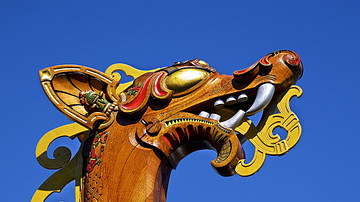Search
Did you mean: Agora?
Search Results

Definition
Roman Army
The Roman army, famed for its discipline, organisation, and innovation in both weapons and tactics, allowed Rome to build and defend a huge empire which for centuries would dominate the Mediterranean world and beyond. Overview The Roman...

Definition
Beowulf
Beowulf is an epic poem composed in Old English consisting of 3,182 lines. It is written in the alliterative verse style, which is common for Old English poetry as well as works written in languages such as Old High German, Old Saxon, and...

Article
How to Become a Medieval Knight
In medieval society a knight enjoyed a position of high status and often wealth, they were feared on the battlefield and known for their chivalry off it, but it took a long time and a lot of training to get there. Trained in weapons handling...

Definition
Menelaus
Menelaus (also Menelaos) is a figure from ancient Greek mythology and literature who was the king of Sparta and the husband of beautiful Helen, whose abduction by the Trojan prince Paris sparked off the legendary Trojan War. The story is...

Definition
Grail Legend
The Grail Legend (also known as the Grail Quest, Quest for the Holy Grail) developed in Europe c. 1050-1485 CE. It most likely originated in Ireland as folklore before appearing in written form sometime before 1056 CE in The Prophetic Ecstasy...

Definition
Ajax (Play)
Ajax is a play written by the 5th-century BCE Greek poet and dramatist Sophocles. Although Sophocles wrote at least 120 plays, only seven have survived. Of his surviving plays, the best-known is Oedipus Rex (Oedipus the King) - part of a...

Article
Tacitus on Boudicca's Revolt
Tacitus (full name, Publius Gaius Cornelius Tacitus, ca. 56 – ca. 117 CE) was a Roman Senator and an important historian of the Roman Empire. In the following passages Tacitus gives an account of the Iceni Queen Boudicca's revolt against...

Article
Unam Sanctam: Spiritual Authority & the Medieval Church
The Unam Sanctam (1302) was a papal bull issued by Pope Boniface VIII (served 1294-1303) requiring the complete submission of all people, including kings, to the authority and dictates of the pope. As the Church was understood as holding...

Definition
Trojan War
The Trojan War was fought between Greeks and the defenders of the city of Troy in Anatolia sometime in the late Bronze Age. The story has grabbed the imagination for millennia but a conflict between Mycenaeans and Hittites may well have occurred...

Definition
Egyptian Empire
The Egyptian Empire rose during the period of the New Kingdom (c. 1570- c. 1069 BCE), when the country reached its height of wealth, international prestige, and military might. The empire stretched from modern-day Syria in the north to modern-day...